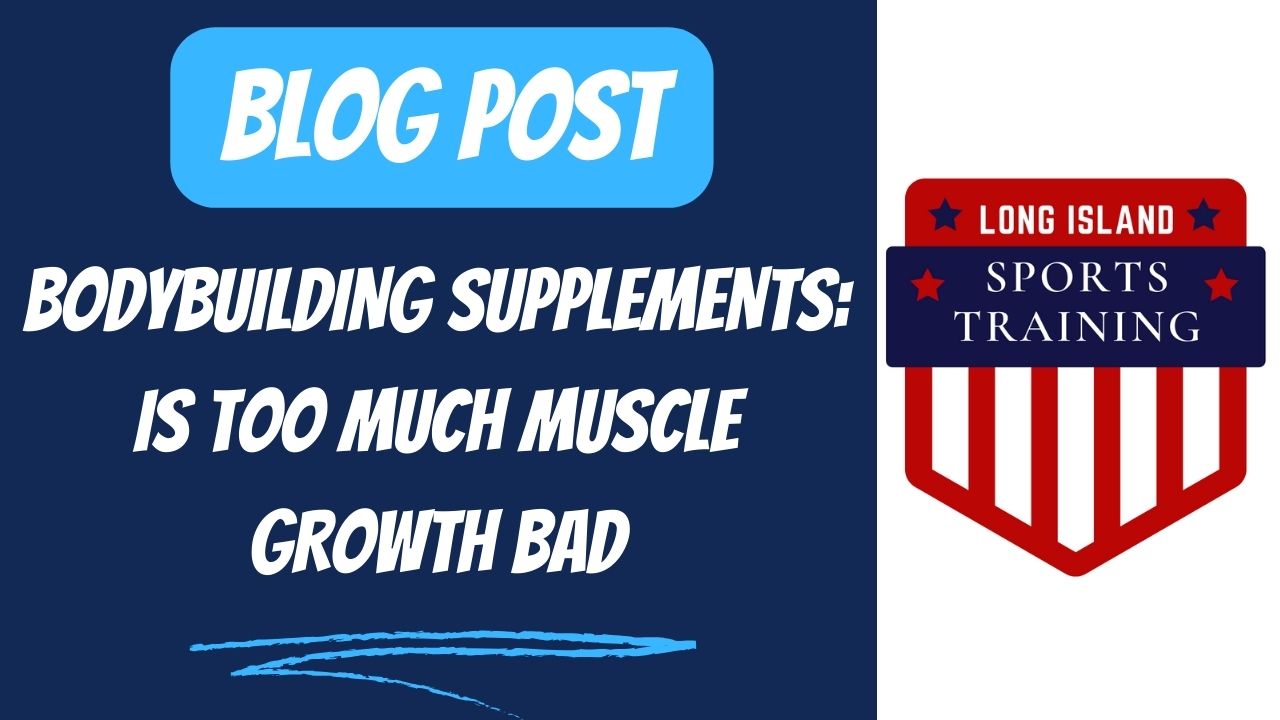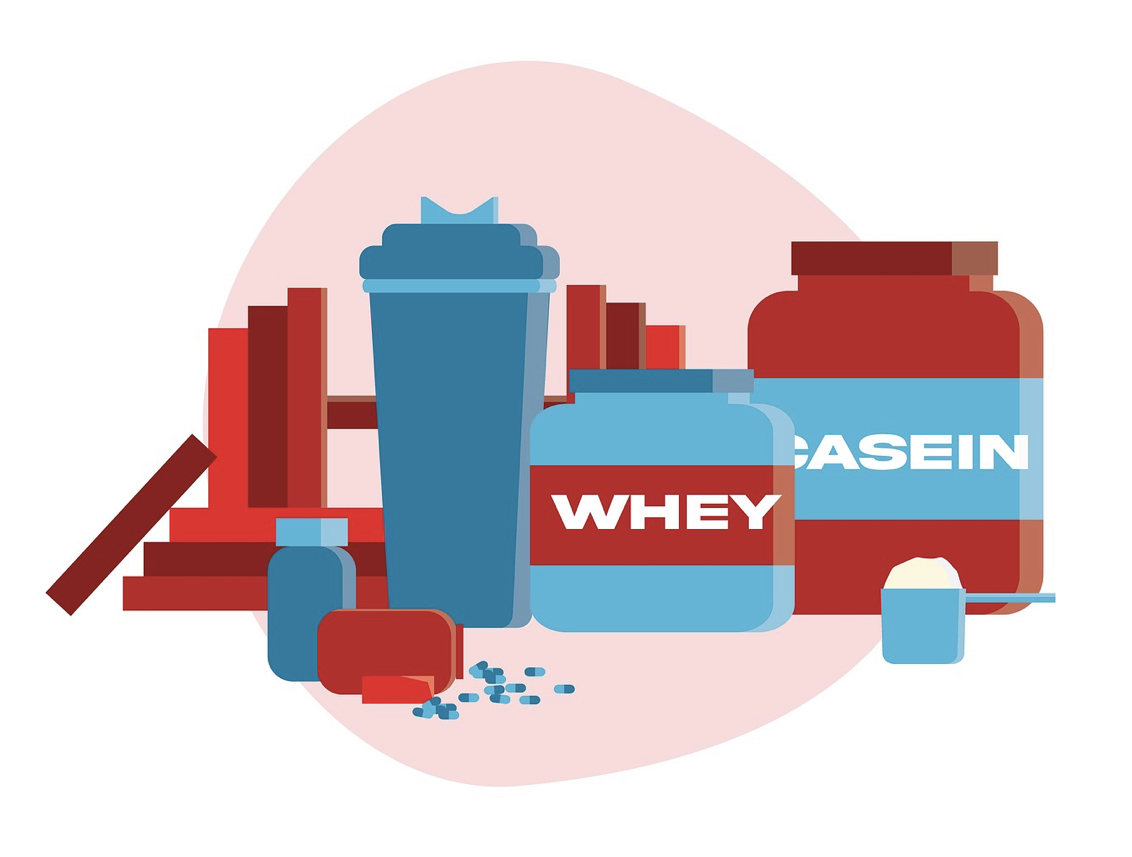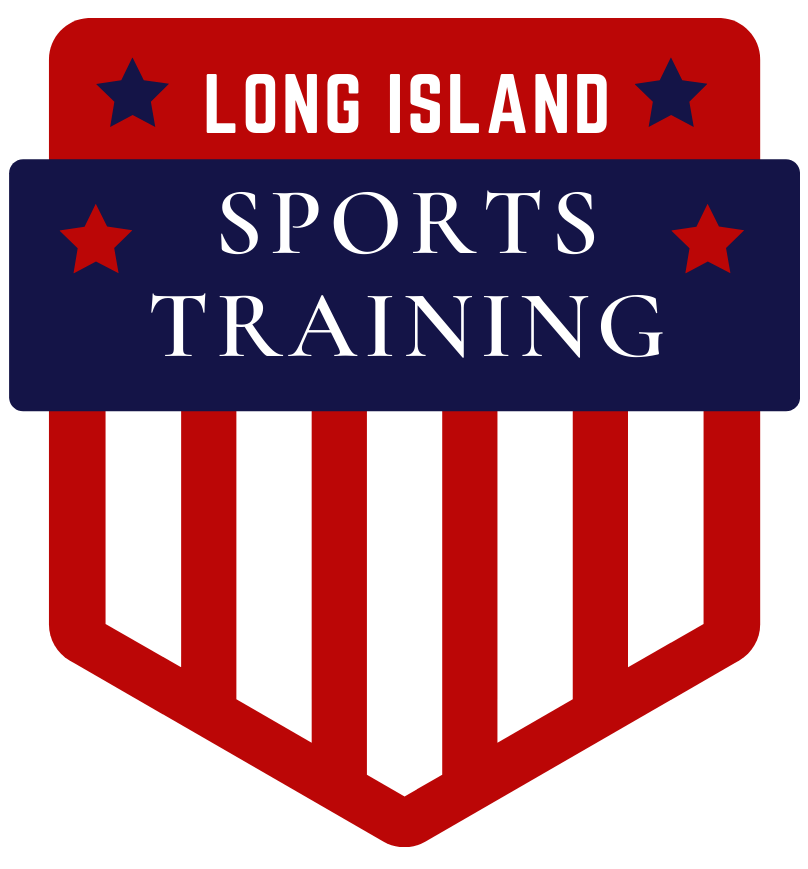Bodybuilding Supplements: Is Too Much Muscle Growth Bad
 Bodybuilding Supplements: Is Too Much Muscle Growth Bad
Bodybuilding Supplements: Is Too Much Muscle Growth Bad
In this blog, Bodybuilding Supplements: Is Too Much Muscle Growth Bad, we dive into the nuanced relationship between muscle growth and athletic performance. By doing so, we try to unravel the complexities that arise when the pursuit of sheer muscle mass encounters the multifaceted demands of competitive sports.
In the world of sports and fitness, the pursuit of optimal performance is a relentless journey. Athletes often explore various avenues to enhance their abilities, and for many, bodybuilding supplements become a tempting option. However, a critical question emerges: Can too much muscle growth be detrimental to athletic performance?
As the allure of bodybuilding supplements continues to grow, athletes find themselves at a crossroads, navigating the fine line between aesthetic gains and functional excellence. We try to address this balancing act by finding answers to the question if too much muscle growth is a boon or bane for athletic prowess?
What Are Bodybuilding Supplements?

Bodybuilding supplements are dietary aids commonly used by individuals engaged in strength training, bodybuilding, or other forms of intense physical activity to support muscle growth, recovery, and overall performance. These supplements are designed to complement a well-rounded diet and training program.
Here are some common types of bodybuilding supplements:
- Protein Supplements:
-
- Whey Protein: Derived from milk, whey protein is a fast-digesting protein source that aids in muscle recovery and growth.
-
- Casein Protein: Another milk-derived protein, casein, is slower-digesting and provides a sustained release of amino acids.
- Amino Acids:
-
- BCAAs (Branched-Chain Amino Acids): Essential amino acids (leucine, isoleucine, and valine) that play a crucial role in protein synthesis and muscle recovery.
- Creatine:
-
- A naturally occurring compound that helps regenerate ATP, the primary energy currency in cells. Creatine is known for enhancing strength, power, and muscle mass.
- Pre-Workout Supplements:
-
- Typically containing caffeine, beta-alanine, and other ingredients, these supplements aim to increase energy, focus, and endurance during workouts.
- Post-Workout Supplements:
-
- Often include a combination of protein and carbohydrates to aid in recovery by replenishing glycogen stores and facilitating muscle repair.
- Testosterone Boosters:
-
- Supplements designed to support or enhance testosterone levels, a hormone associated with muscle growth and strength.
- Fat Burners:
-
- Containing stimulants and other ingredients, these supplements aim to boost metabolism and support fat loss.
- Vitamins and Minerals:
-
- Essential for overall health, certain vitamins and minerals play a crucial role in energy metabolism, muscle function, and recovery.
- Omega-3 Fatty Acids:
-
- Known for their anti-inflammatory properties, omega-3s contribute to joint health and overall well-being.
It’s important to note that while these supplements can offer benefits, they are not a substitute for a balanced diet. Athletes should approach supplementation with caution, considering their individual needs, goals, and potential health implications.
Consulting with a healthcare professional or nutritionist is advisable before incorporating new supplements into a fitness regimen.
Are Bodybuilding Supplements Safe?
Generally, many bodybuilding supplements are considered safe when used according to recommended guidelines and in appropriate doses. However, it’s crucial to note that the safety of supplements can vary widely, and individual responses may differ.
Here are some key considerations regarding the safety of bodybuilding supplements:
- Quality and Regulation:
-
- The supplement industry is not as tightly regulated as pharmaceuticals, so the quality and purity of products can vary. Choosing supplements from reputable brands that adhere to good manufacturing practices (GMP) can reduce the risk of contamination and ensure product quality.
- Individual Variability:
-
- Individuals may react differently to supplements based on factors such as genetics, existing health conditions, and other medications they may be taking. It’s essential to consider individual variability and consult with a healthcare professional before starting any new supplement regimen.
- Dosage and Timing:
-
- Following recommended dosages is crucial. Taking excessive amounts of certain supplements can lead to adverse effects. Additionally, the timing of supplementation, especially around workouts, can impact effectiveness and safety.
- Potential Side Effects:
-
- Some supplements may have side effects, and these can vary. For example, high doses of certain vitamins and minerals may cause adverse reactions. Creatine, a generally well-tolerated supplement, may lead to stomach discomfort in some individuals.
- Interaction with Medications:
-
- Certain supplements may interact with medications or exacerbate pre-existing health conditions. It’s vital to inform healthcare providers about any supplements being taken, especially if someone is on medication or has underlying health concerns.
- Long-Term Effects:
-
- Limited research exists on the long-term effects of some supplements. Athletes should be cautious about relying solely on supplements for nutrition and consider a well-rounded, whole-food-based diet for sustained health.
- Unregulated Ingredients:
-
- Some supplements may contain unregulated or novel ingredients that lack sufficient safety data. Athletes should be cautious about using products with proprietary blends or undisclosed ingredients.
Before incorporating any bodybuilding supplement into a routine, individuals should consult with a healthcare professional or a registered dietitian. They can provide personalized advice based on health status, goals, and specific dietary needs.
Additionally, periodic health check-ups can help monitor the impact of supplements over time and address any emerging concerns.
How Do Bodybuilding Supplements Effect Muscle Growth
Bodybuilding supplements can influence muscle growth through various mechanisms, playing specific roles in supporting different aspects of the muscle-building process. Study – https://pubmed.ncbi.nlm.nih.gov/30604177/
Here’s a breakdown of how some common supplements affect muscle growth:
- Protein Supplements (Whey, Casein): Muscle Repair and Growth: Proteins are essential for muscle repair and growth. Whey protein, in particular, is rich in branched-chain amino acids (BCAAs), notably leucine, which is a key trigger for protein synthesis.
- Creatine: Increased ATP Production: Creatine helps replenish adenosine triphosphate (ATP), the primary energy currency in cells. This, in turn, supports increased strength and power during resistance training, promoting muscle growth.
- BCAAs (Branched-Chain Amino Acids): Stimulate Protein Synthesis: BCAAs, especially leucine, play a crucial role in stimulating protein synthesis, the process by which the body builds new muscle proteins.
- Pre-Workout Supplements: Enhanced Performance: Ingredients like caffeine in pre-workout supplements can increase alertness and energy levels, potentially leading to more intense and effective workouts, which, over time, may contribute to muscle growth.
- Post-Workout Supplements: Recovery and Nutrient Replenishment: Post-workout supplements containing protein and carbohydrates help replenish glycogen stores and provide the necessary nutrients for muscle repair and recovery after intense exercise.
- Testosterone Boosters: Hormonal Support: Some supplements claim to support testosterone levels, a hormone associated with muscle growth. However, the effectiveness and safety of these supplements can vary, and their impact on muscle growth may be influenced by individual factors.
It’s important to note that the effectiveness of bodybuilding supplements can vary among individuals, and results may depend on factors such as training intensity, overall nutrition, and individual response to specific supplements. Additionally, supplements work best when used in conjunction with a well-balanced diet and a structured workout program.
While supplements can be beneficial, they are not a substitute for a solid foundation of proper nutrition and consistent, progressive resistance training.
How Can Too Much Muscle Growth Hinder Athletic Performance

Excessive muscle growth, beyond what is functionally necessary for a specific sport, can potentially hinder athletic performance in several ways.
Here are some negative impacts associated with too much muscle growth:
- Reduced Flexibility and Agility: Excessive muscle mass can limit joint flexibility and range of motion, compromising an athlete’s agility and ability to move quickly and efficiently.
- Decreased Speed: A disproportionate increase in muscle size without a corresponding improvement in strength can lead to reduced speed, as the added mass may impede rapid and coordinated movement.
- Increased Injury Risk: Imbalances in muscle development can result in an uneven distribution of forces on joints and tissues, potentially increasing the risk of injuries, such as strains and sprains.
- Cardiovascular Strain: Too much muscle mass can place additional strain on the cardiovascular system, making it more challenging for the heart to supply oxygen and nutrients to the increased muscle volume.
- Diminished Endurance: While increased muscle mass can contribute to short bursts of power, it may negatively impact endurance, especially in activities that require sustained effort over longer durations.
- Weight-to-Strength Ratio Imbalance: In certain sports, the weight-to-strength ratio is critical. Excessive muscle growth without a corresponding increase in strength may result in diminished relative strength, affecting an athlete’s performance in activities like running, jumping, or bodyweight exercises.
- Energy Demands: Maintaining larger muscles requires additional energy. If an athlete’s training program and nutrition are not aligned, the energy demands of excessive muscle mass can lead to fatigue and suboptimal performance.
- Sport-Specific Considerations: Different sports have unique demands, and too much muscle growth may not align with the specific requirements of certain activities. For example, endurance athletes may find excess muscle mass to be a hindrance to their performance.
It’s crucial to emphasize that the impact of muscle growth on athletic performance is highly individualized, and some athletes may thrive with a higher muscle mass.
Striking a balance that aligns with the specific needs and demands of the sport, along with considering individual factors such as body type and genetics, is essential for optimizing athletic performance.
Athletes should focus on functional strength, flexibility, and sport-specific skills to ensure that muscle growth enhances rather than hinders their overall abilities.
What Are The Safest And Most Effective Bodybuilding Supplements For Muscle Growth
Determining the safest and most effective bodybuilding supplements can depend on individual factors, health status and specific fitness goals.
However, several supplements have a solid foundation of research supporting their safety and effectiveness for many individuals.
Here are some commonly recognized and researched bodybuilding supplements:
- Whey Protein:
-
- Effectiveness: Rapidly absorbed and rich in essential amino acids, promoting muscle protein synthesis.
-
- Safety: Generally safe for most people, though those with lactose intolerance may opt for lactose-free versions.
- Creatine Monohydrate:
-
- Effectiveness: Well-established for improving strength, power, and muscle mass.
-
- Safety: Considered safe for most when used as directed; however, individuals with kidney issues should consult a healthcare professional.
- Branched-Chain Amino Acids (BCAAs):
-
- Effectiveness: May support muscle protein synthesis and reduce muscle soreness.
-
- Safety: Generally safe; however, obtaining BCAAs from whole protein sources is also effective.
- Fish Oil/Omega-3 Fatty Acids:
-
- Effectiveness: Supports heart health, reduces inflammation, and aids recovery.
-
- Safety: Generally safe, but high doses may interact with certain medications; consult a healthcare professional.
- Beta-Alanine:
-
- Effectiveness: Supports endurance and may reduce muscle fatigue.
-
- Safety: Generally safe, but some individuals may experience tingling sensations (paresthesia).
- Protein Bars and Whole Food Alternatives:
-
- Effectiveness: Convenient sources of protein and nutrients.
-
- Safety: Check ingredient lists for added sugars and artificial additives; whole foods are often preferable.
- Caffeine:
-
- Effectiveness: Improves alertness and may enhance performance.
-
- Safety: Generally safe, but individual responses vary; excessive intake can lead to negative side effects.
- Multivitamins:
-
- Effectiveness: Fills potential nutrient gaps in the diet.
-
- Safety: Generally safe when used as a supplement to a well-balanced diet; avoid excessive doses of individual vitamins and minerals.
It’s important to note that individual responses to supplements can vary, and not everyone may benefit equally. Moreover, the best approach to supplementation is often through a combination of a well-rounded diet and targeted supplement use.
Before incorporating any new supplement, it’s advisable to consult with a healthcare professional or a registered dietitian, especially if you have pre-existing health conditions or are taking medications. They can provide personalized guidance based on your individual needs and circumstances.
What Bodybuilding Supplements Are Banned?
Sports organizations and governing bodies often maintain lists of banned substances to ensure fair competition and athlete safety.
These lists can include various bodybuilding supplements and performance-enhancing substances. Some common categories of banned substances include:
- Anabolic Steroids:
-
- Examples: Testosterone, Nandrolone and Stanozolol
-
- These substances mimic the effects of natural testosterone and can significantly enhance muscle growth.
- Peptide Hormones:
-
- Examples: Growth hormone (HGH), insulin-like growth factor-1 (IGF-1).
-
- These hormones regulate growth and metabolism and are sometimes abused for performance enhancement.
- Stimulants:
-
- Examples: Amphetamines, ephedrine, and some pre-workout stimulant ingredients.
-
- Stimulants can enhance alertness and energy but may also pose health risks.
- Selective Androgen Receptor Modulators (SARMs):
-
- Examples: Ostarine, Ligandrol.
-
- These compounds can have effects similar to anabolic steroids and are banned in many sports.
- Diuretics:
-
- Examples: Furosemide, hydrochlorothiazide.
-
- Diuretics can be used to manipulate body weight and mask the presence of other banned substances.
- Beta-2 Agonists:
-
- Examples: Clenbuterol.
-
- These substances can have bronchodilator effects and are sometimes abused for weight loss and performance enhancement.
It’s important to note that the specific list of banned substances can vary among different sports organizations. Major anti-doping agencies, such as the World Anti-Doping Agency (WADA), maintain a comprehensive list of prohibited substances and methods.
Athletes are responsible for ensuring that the supplements they use comply with anti-doping regulations.To minimize the risk of inadvertently consuming banned substances, athletes should choose supplements from reputable brands that undergo rigorous testing and adhere to quality standards.
Additionally, consulting with a sports nutritionist or healthcare professional can help athletes make informed decisions about supplement use while staying in compliance with anti-doping regulations.
What Are The Best Foods To Eat Instead Of Taking Bodybuilding Supplements

Opting for whole foods is an excellent way to naturally support your bodybuilding goals, as they provide a broad spectrum of nutrients.
Here are some nutrient-dense foods that can serve as alternatives or complements to bodybuilding supplements:
- Protein Sources:
-
- Chicken Breast: Lean and rich in protein.
- Fish (Salmon, Tuna): Excellent sources of omega-3 fatty acids and high-quality protein.
- Eggs: A complete protein source with essential amino acids.
- Greek Yogurt: High in protein and often contains probiotics.
- Complex Carbohydrates:
-
- Quinoa: Rich in protein, fiber, and various nutrients.
- Sweet Potatoes: Provide complex carbohydrates, vitamins, and minerals.
- Oats: High in fiber and a good source of energy.
- Brown Rice: A complex carbohydrate with essential nutrients.
- Healthy Fats:
-
- Avocado: Packed with healthy monounsaturated fats.
- Nuts and Seeds: Almonds, walnuts, chia seeds, and flaxseeds provide healthy fats and additional nutrients.
- Olive Oil: A source of monounsaturated fats and antioxidants.
- Dairy and Alternatives:
-
- Milk: A good source of protein, calcium, and vitamin D.
- Cheese: Provides protein and essential minerals.
- Plant-Based Alternatives: Fortified plant milks and yogurts can be suitable for those with dairy restrictions.
- Vegetables:
-
- Leafy Greens (Spinach, Kale): Rich in vitamins, minerals, and antioxidants.
- Broccoli: Contains fiber, vitamins, and phytochemicals.
- Bell Peppers: High in vitamin C and other antioxidants.
- Fruits:
-
- Berries (Blueberries, Strawberries): Packed with antioxidants.
- Bananas: Provide energy and contain potassium.
- Oranges: A good source of vitamin C.
- Whole Grains:
-
- Whole Wheat Bread: Contains complex carbohydrates and fiber.
- Barley: High in fiber and various nutrients.
- Buckwheat: A gluten-free grain with protein and minerals.
- Lean Meats:
-
- Turkey: A lean source of protein.
- Lean Beef: Provides essential nutrients like iron and zinc.
- Legumes:
-
- Lentils: Rich in protein, fiber, and various nutrients.
- Chickpeas: High in protein and can be used in various dishes.
- Hydration:
-
- Water: Staying hydrated is crucial for overall health and athletic performance.
While whole foods offer a plethora of benefits, individual nutritional needs may vary. Consulting with a registered dietitian or nutrition professional can help create a personalized meal plan that aligns with your bodybuilding goals.
In doing so, also take into account factors like calorie requirements, macronutrient ratios and specific dietary preferences or restrictions.
What Are The Main Differences Between Men And Women When Taking Bodybuilding Supplements
While many bodybuilding supplements can be beneficial for both men and women, there are some key differences to consider due to the physiological distinctions between genders.
Here are the main differences when it comes to taking bodybuilding supplements for muscle growth, potential side effects and overall health:
- Hormonal Differences:
-
- Muscle Growth: Men typically have higher levels of testosterone, a hormone strongly linked to muscle growth. As a result, men might experience faster and more substantial muscle gains compared to women.
-
- Side Effects: Supplements that influence hormones, such as testosterone boosters, may have different effects and potential side effects in men and women.
- Protein Requirements:
-
- Muscle Growth: Protein is crucial for muscle growth in both men and women, but the optimal intake may vary based on factors like body weight and muscle mass goals.
-
- Overall Health: Protein plays a vital role in overall health for both genders, supporting various bodily functions beyond muscle development.
- Creatine Response:
-
- Muscle Growth: Creatine is effective for both men and women in enhancing strength and muscle mass. However, women may generally have a lower baseline creatine level than men.
-
- Side Effects: Creatine is generally well-tolerated, but individual responses can vary. Women may experience similar benefits with appropriate dosages.
- Side Effects of Testosterone-Related Supplements:
-
- Muscle Growth: Some supplements, like testosterone boosters, may have different effects in men and women due to variations in baseline testosterone levels.
-
- Overall Health: The potential side effects of testosterone-related supplements, such as changes in mood or hormonal balance, can differ between genders.
- Energy and Macronutrient Needs:
-
- Muscle Growth: Both men and women require sufficient energy and macronutrients to support muscle growth. The specific dietary needs may vary based on factors like basal metabolic rate and activity levels.
-
- Overall Health: Ensuring an appropriate balance of nutrients is essential for overall health, but the specific ratios may differ between men and women.
- Iron Requirements:
-
- Overall Health: Women generally have higher iron requirements than men due to menstrual losses. Adequate iron intake is crucial for both genders to prevent deficiencies.
- Potential for Side Effects:
-
- Individual Variability: Side effects can vary widely among individuals based on factors like genetics, overall health, and existing medical conditions. Women may be more susceptible to certain side effects depending on the supplement.
It’s essential for both men and women to approach bodybuilding supplements with an awareness of their individual needs, health status, and goals.
Consulting with healthcare professionals or registered dietitians can provide personalized guidance to ensure that supplementation aligns with individual health requirements and objectives.
Conclusion
In conclusion, the quest for athletic excellence must involve a thoughtful, individualized approach to muscle growth. Too much or too little can impact performance, and athletes should navigate this terrain with a keen awareness of their sport’s demands, their own body’s response, and the principles of balanced training.
The pursuit of muscle growth should not overshadow the broader aspects of athletic performance, emphasizing the importance of a holistic approach that aligns with the unique requirements of each athlete.
Striking a delicate balance emerges as a key theme in this exploration. Excessive muscle growth, when disproportionate or not accompanied by improvements in functional strength, flexibility, and agility, may indeed pose challenges for athletes. The impact on athletic performance varies, influencing factors such as speed, endurance and the weight-to-strength ratio crucial for certain sports.
The potential downsides of too much muscle growth include reduced flexibility, increased injury risks, cardiovascular strain, and an imbalance in the weight-to-strength ratio. Moreover, the individual variability in response to muscle growth emphasizes the importance of tailoring training regimens and supplement choices to the specific needs of each athlete.
The careful consideration of nutritional aspects, including the strategic use of bodybuilding supplements, is vital. While supplements like protein, creatine, and branched-chain amino acids contribute to muscle growth, they should be integrated into a comprehensive program that prioritizes functional strength, cardiovascular fitness and injury prevention.
Disclaimer – The content on this website is for educational purposes and is not intended to offer personal medical advice. You should seek the advice of your physician, doctor or another qualified health provider with any questions you may have regarding supplement ingestion or other medical conditions. Do not disregard professional medical advice or delay in seeking it because of something you have read on this website. Long Island Sports Training does not specifically recommend or endorse any products.
Let’s Talk: Contact Tim @ Long Island Sports Training
If you are looking for local sports or fitness training sessions to help you reach peak performance contact us:
Web Page:
https://longislandsportstraining.com/services/
Phone:
631-594-4048
Email:
Tim@LongIslandSportsTraining.Com
